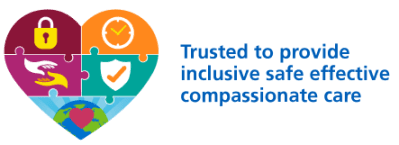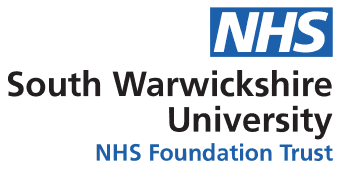Maternity services at SWFT have created a resource on a platform called Padlet which contains lots of evidence based information about keeping well during your pregnancy.
To access this, please scan the below QR code using the camera on your phone or tablet, or click on the following link: Maternity Services Public Health Information.

The more active and fit you are, the easier it will be for you to cope comfortably with your changing shape and weight during pregnancy, the demands of labour and looking after a newborn baby. Regular walking, swimming and yoga can help you keep active during pregnancy.
It is not a good idea to start doing vigorous exercise if your body is not already used to it. Please ask your midwife for further advice.
To find out more, click on the below links:
It is important to eat a varied and healthy diet throughout your pregnancy. Iron tablets are not given as a matter of routine but only when necessary based on the results of your blood tests.
You can learn more by clicking on the following links:
Please visit the NHS website (link below) to find out which foods may contain elements which could be harmful to your unborn child and therefore you’re advised to avoid during pregnancy.
If you’re more than 10 weeks pregnant or have a child under 4, you may be entitled to help with buying healthy food and milk. If you're eligible, you can use your card to buy:
- Plain liquid cow’s milk
- Fresh, frozen, and tinned fruit and vegetables
- Fresh, dried, and tinned pulses
- Infant formula milk based on cow’s milk
You can also use your card to collect:
- Healthy Start vitamins – these support you during pregnancy and breastfeeding
- Vitamin drops for babies and young children which are suitable from birth to 4 years old
Healthy Start vitamins can be collected from your local Children and Family Centre, or the Bluebell Birth Centre at Warwick Hospital when attending a midwifery appointment.
To learn more, please click on the below links:
- Get help to buy food and milk
- NHS Healthy Start - YouTube video
All individuals using GLP-1 medications should take steps to ensure they do not become pregnant.
GLP-1 medicines should not be taken during pregnancy or just before trying to get pregnant. This is because there is not enough safety data to know whether taking a GLP-1 medicine can cause harm to the baby.
If you are using a GLP-1 medicine and think you might be pregnant, speak to a healthcare professional straight away.
GLP-1 medicines should not be taken by people who are breastfeeding/chestfeeding.
GLP-1 medications: Wegovy, Mounjaro, Ozempic, Rybelsus

This is an infection which is not usually dangerous to healthy adults and children but could harm an unborn baby. We do not routinely test for this infection but would advise the following precautions:
- If you do not have to pick up or handle cats, then don’t
- Cat owners, in particular, should take extra care since the infection can be caught from cat faeces - you should, for example, wear rubber gloves when changing cat litter
- Wash your hands thoroughly before preparing any food
- Ensure raw meats are stored separately at the bottom of your fridge and only eat meat which has been cooked thoroughly
- Wash fruit and vegetables thoroughly to remove all traces of soil
To read more about toxoplasmosis, click on the below link:
You are more likely to have a healthier pregnancy and baby if you do not smoke. If you smoke during pregnancy, we will offer you help to quit and improve the health outcomes for you and baby.
If you identify yourself as a smoker, a member of the Maternity Services Tobacco Dependency Team, (previously the NHS Stop Smoking in Pregnancy Team, will get in touch to offer you support with stopping smoking. You can access this support at any time throughout your pregnancy, so please discuss smoking with your midwife.
What we do
At your first appointment with your midwife, you will be asked to do a simple breath test for carbon monoxide (CO). CO is a toxic gas released from tobacco smoke, exhaust fumes and faulty gas appliances.
CO is extremely harmful to you and your baby:
- Each time you smoke your baby is deprived of the oxygen, which they need to grow, for about 20 minutes
- It deprives your muscles, brain and body tissues of oxygen
- It damages your placenta
- It restricts the oxygen supply to your baby
- It can lead to poor growth, premature birth and still birth
Why should you quit smoking?
The earlier you stop the better. But it’s never too late to quit!
- Your baby will feel the benefits straight away
- You will reduce the risk of your baby being born underweight and under-developed
- You and your baby will be free from CO in less than 24 hours
Plus…
- More money to spend on you and your baby
- More time to spend with your family
- Reduced stress and anxiety
- Better health in the future
Maternity Services Tobacco Dependency Team
We want you to have the best chance of a healthy and happy baby, so we refer all smokers to the Maternity Services Tobacco Dependency Team for help to quit. We’re not here to tell you to stop. We’re here to help if you want to quit.
We’re here to give you honest, unbiased support to help you take steps towards a healthy, smoke-free pregnancy. We offer free Nicotine Replacement Therapy (NRT) to all our clients, including patches and gum to help you quit, and are always on hand to answer any questions or concerns you might have.
Our Maternity Services Tobacco Dependency Advisors will offer you appointments at the hospital or in the community, where you can discuss your options and receive one-to-one support tailored to your needs.
We understand that everyone is different, and our advisors have the knowledge and experience to help find the best way forward for you. Support doesn’t stop after one session — we’re with you throughout your pregnancy, providing regular appointments to encourage, advise, and help you succeed.
Normally, you can access our services by being referred by your midwife but if you want to email us (ssip
Fact: You are up to 4 times more likely to stop smoking successfully with the Maternity Services Tobacco Dependency Team by your side, than if you go it alone.
Contact and location
Address:
Useful links
Our Trust has a no smoking policy which means you cannot smoke anywhere on hospital premises.
The Department of Health advises that you should avoid all alcohol during pregnancy. Using illegal or street drugs during pregnancy, including cannabis, ecstasy, cocaine and heroin, could seriously affect your unborn baby. If you regularly use drugs, it's important to address this now you're pregnant.
Please discuss any alcohol and drug use with your midwife so that we can put support into place for your pregnancy. It’s important to be honest. Your midwife is there to help you have a safe and healthy pregnancy and will not judge you.
To find out more, click on the following links:
- Drinking alcohol while pregnant - NHS website
- Alcohol in pregnancy - Tommy's website
- Illegal drugs in pregnancy - NHS website
- Illegal or recreational drugs and pregnancy - Tommy's website
- Warwickshire drug and alcohol service
There is no physical reason why you should not continue to have sexual intercourse throughout a normal pregnancy. Your midwife is happy to discuss this subject and help with any concerns you may have.
For more information, visit the following webpage:
Generally if you’re pregnant or breastfeeding you’re advised not to take medication that can be brought from a shop without first consulting with your midwife or a pharmacist. All prescribed medication will be provided by a doctor, such as your GP or obstetrician, after confirming it is safe to take.
For more information, visit the following webpages:
- Medicines in pregnancy - NHS website
- Medicines in Pregnancy: Safe and Unsafe to Take - Tommy's website
All prescriptions and NHS dental treatment are free while you're pregnant and for 12 months after your baby's birth date.
To claim free prescriptions, ask your midwife for an FW8 form (paper or digital copies available) at your booking appointment, or your GP. Once completed, this should be sent to the address noted on the form. You will then receive an NHS Maternity Exemption Certificate.
Please show your certificate to your dentist, to ensure you get free NHS dental treatment.
During your pregnancy you will be offered the whooping cough (pertussis) vaccine, the respiratory syncytial virus (RSV) vaccine and the flu vaccine. Vaccinations during pregnancy are important as they protect you and your baby from serious illness.
For further information about vaccinations in pregnancy, click on the following links:


